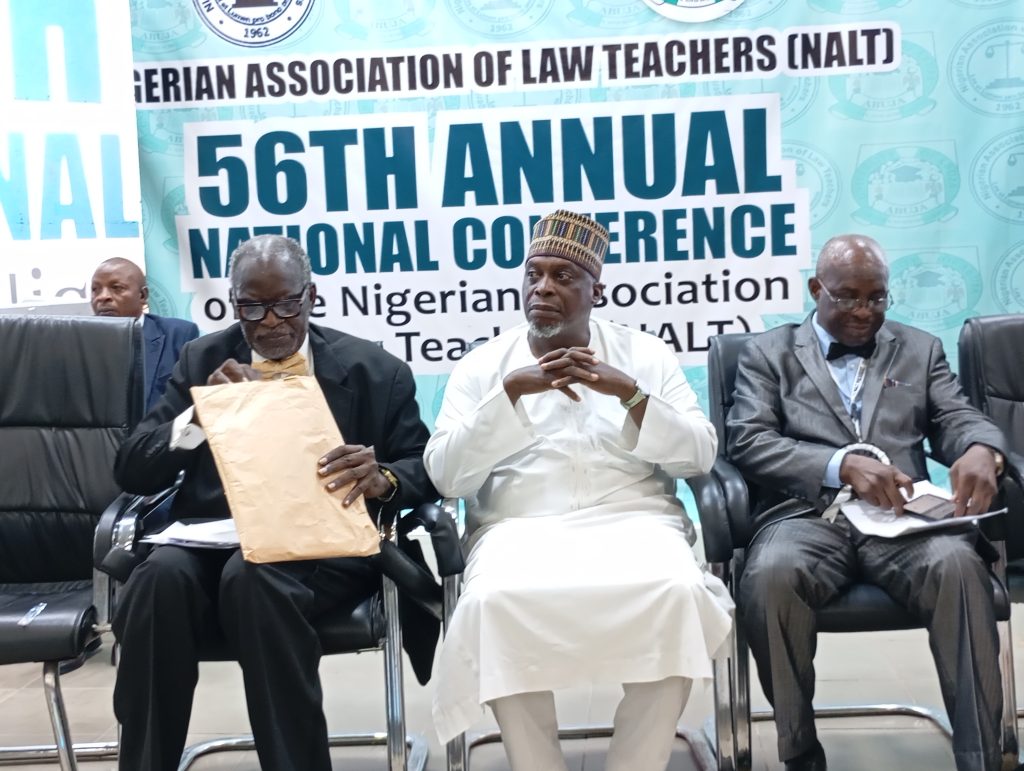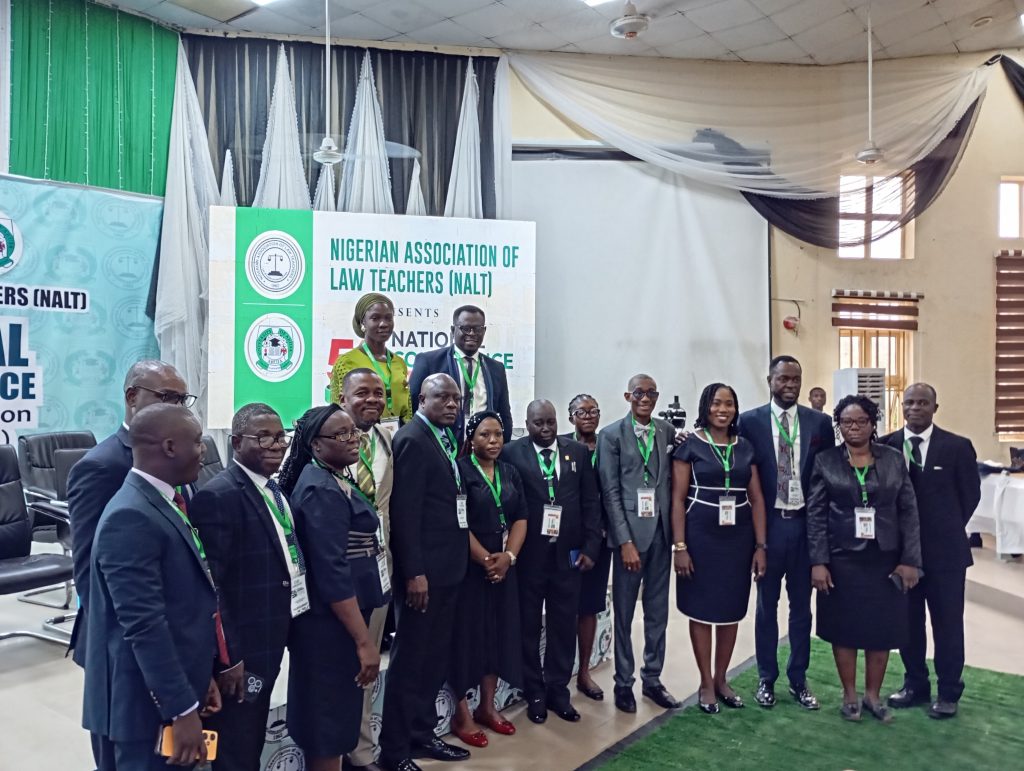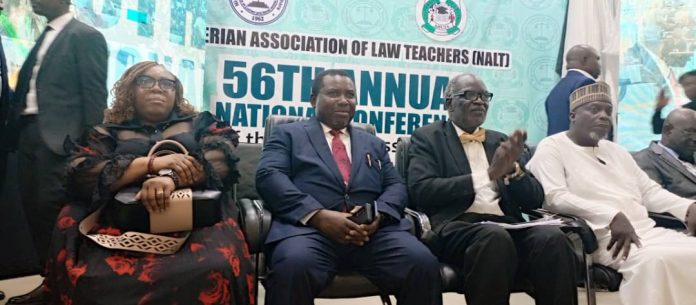The Chairman of Independent National Electoral Commission, INEC, Prof. Joash Amupitan, SAN, has reaffirmed his commitment to uphold integrity, fairness, and transparency in Nigeria’s electoral process, urging the nation’s legal experts to partner with the Commission in reforming the system.
Amupitan, who spoke at the 56th Annual Conference of the Nigerian Association of Law Teachers, NALT, in Abuja, described the event as “a momentous occasion” that brought him before his mentors and colleagues in the legal profession.
The INEC Chairman said law remains a vital instrument of social and political engineering, stressing that national development and economic sustainability are impossible without strong legal foundations.
“Law is not merely a set of rules but the foundation upon which societies build progress. It guides ethical governance, fosters economic opportunities, and upholds citizens’ rights,” he stated.
Amupitan acknowledged that while the National Assembly has made progress in amending the Electoral Act, more needs to be done to strengthen the framework for credible elections.
“There is little INEC can do by way of policy if the law does not support us. I will work closely with the legislature to ensure we have enduring electoral laws that all Nigerians can be proud of,” he said.
He called on legal scholars to support the Commission through constructive criticism, research, and advocacy.

“Look at me as your ambassador. I need your prayers,” he said.
While emphasizing the importance of patriotism and collective responsibility, the INEC boss said Nigeria’s progress depends on effective leadership and commitment to national ideals.
Quoting Kenyan scholar Prof. Patrick Lumumba, he reminded participants that Africa’s rise is tied to Nigeria’s realization of its potential.
“Whenever Nigeria provides leadership, Africa takes its rightful place. One way of fixing Nigeria begins from gatherings like this,” he stated.
Amupitan, who described NALT as “a movement for mentorship and national rebirth,” thanked the association for its support and promised to revisit before the end of the conference.
He urged all participants to uphold the ideals of justice, truth, and nation-building through the law.

Earlier, the National President of NALT, Prof Oluwole Akintayo, called for the repositioning of law as a central instrument for Nigeria’s national development, economic renewal, and democratic integrity.
“The rule of law must serve and build the foundation of market efficiency and the engineering of human dignity. As law teachers, we have the privilege and duty to ensure that our students, the next generation of jurists and policy makers, internalize this delicate balance,” he said.
Akintayo said the law must move from being a “passive spectator” to an “active architect” of national progress.
“Our theme, National Development and Economic Sustainability in a Globalized World, could not be more timely and more consequential.
“It situates us at the intersection of law, economics, and governance, challenging us to interrogate the role of law not as a passive spectator, but as an active architect of Nigeria’s development aspirations in an era defined by global integration, technological disruption, and shifting geopolitical realities,” he said.
According to him, law structures incentives, mediates relationships, and institutionalizes accountability, adding that every serious national conversation must engage with the legal frameworks that enable development.
The NALT President urged law teachers to engage in scholarship that impacts society beyond academia, citing the late U.S. Supreme Court Justice Ruth Bader Ginsburg, who taught that true professionalism means “doing something outside yourself, something to repair tears in your community.”
Akintayo decried Nigeria’s economic hardship, rising inflation, and unemployment, noting that these have deepened inequality and tested the country’s governance framework.
He also expressed concern over the increasing number of law graduates and the pressure it places on professional standards and ethics.
He described as “a proud moment” the appointment of Prof. Joash Amupitan SAN, a NALT trustee and former dean, as the new Chairman of the Independent National Electoral Commission, INEC, saying it offers the association an opportunity to contribute meaningfully to strengthening electoral jurisprudence and democratic governance.
“Electoral justice lies at the foundation of democratic legitimacy and sustainable development; a credible electoral system strengthens national cohesion and promotes public trust,” he said.
Akintayo challenged participants to interrogate how far Nigeria’s legal order has evolved to sustain inclusive growth and support innovation in a globalized economy.
“These are urgent imperatives. The answers must come from us, the teachers, the thinkers, and the custodians of Nigeria’s legal consciousness,” he said.
He commended the University of Abuja for hosting the conference for the first time since its establishment in 1988 and urged law teachers to mentor the next generation to use law as a tool for justice, inclusion, and national transformation.
The Conference with the theme “National Development and Economic Sustainability in a Globalized World,” brought together eminent scholars, deans, and legal practitioners from universities across the country.
On his part, the Chairman, Board of Trustees, BoT, of NALT, Prof Ademola Popoola, warned that globalization, though hailed as a force for progress, has deepened inequality and left many developing nations worse off.
Popoola said while globalization offers opportunities, its benefits have largely eluded poorer countries.
“Many developing nations have opened their economies with little to show for it, as rapid financial and trade liberalization continues to cause economic losses and social dislocation,” he said.
While citing the UNDP Human Development Report, he noted that the richest 20 per cent of the world’s population control 82 per cent of global trade and 68 per cent of foreign direct investment, while the poorest fifth share barely 1 per cent.
He argued that globalization is shaped mainly by policy choices dominated by developed countries and global institutions under their control.
“The assumption that everyone gains from liberalization has proven overly optimistic,” he said.
Popoola urged scholars and policymakers to rethink global economic policies and craft inclusive frameworks that promote justice, sustainability, and shared prosperity.



